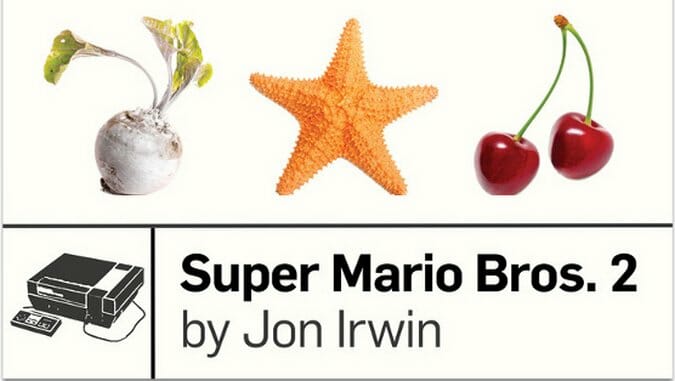
I have a confession to make at the top here: I had a giggle or two about the prospect of someone writing a Super Mario Bros. 2 book. As far as I know, I’m one of the few reviewers of “videogame books,” and more than once I had someone ask me to my face or GChat me a version of “so are you excited to read a book about SMB2?” And then they would lol at me and I would express my unhappiness at the prospect and time would pass into spring, summer, and fall. The comedy and the dread, in case you aren’t familiar with SMB2, comes from the fact that there doesn’t seem to be a whole lot to say about the game that hasn’t been driven into the ground like an asteroid from orbit. Every videogame “weird trivia” listicle from 1995 onward has included some version of “did u kno that Super Mario Bros. 2 was really a Japanese game called Doki Doki Panic?!” In the age of the YouTube “cool factoid” video, this information gets presented again and again, sometimes with a comedic aside about Birdo that should leave the viewer with a leaden taste in her mouth.
I confess all of that in order to own up to it and say that all my assumptions about what author Jon Irwin might do with the game were wrong. Super Mario Bros. 2 is an extensive critique that explores the history, production ecology, and player experiences of that game. It has no pretensions about itself as a book, and because of that Irwin is able to fully embrace a sense of wonder or incredulousness when he is, for example, watching speedrunner Andrew Gardikis float through a game level with grace in a small, cold coffee shop in New England.
The interview and interlude with and about Gardikis is represetative of Super Mario Bros. 2’s core strength: Irwin knows that the game itself cannot support 160+ pages of inquiry. Instead, he uses it as a sea to float interesting interludes on, like an interview with Gail Tilden, an early employee of Nintendo of America who eventually oversaw the global launches of both Pocket Monsters and the Wii. Dozens of pages later, he moves onto a longform analysis of Koji Kondo’s score for the game, comparing it to the earworm themes of the first game. All of these things, impossibly, flow together. This is even more striking in comparison to earlier Boss Fight Books that I have reviewed, like Galaga and Chrono Trigger, two books that felt staccato and machinelike respectively.
It is fitting that SMB2 is the final book in “season one” of Boss Fight’s initial lineup. It seems to have combined the historical, critical, and personal aspects of the various releases into an ur-object that presents a strange game to an audience while treating them with respect. However, because of this feeling of distillation, SMB2 never has any moments where its grasp extends beyond what Irwin is comfortable doing. All of the edges of the book are polished, which means that there are very few moments of friction in the text. I spent most of my time reading the book silently nodding along, smiling every now and again, and generally cruising through it without having to reflect or think very hard about the game or what I was reading about that game.
The moments where Irwin gives into a “literary genre” excess, however, are the strangest parts, and those are probably the roughest patches (despite not being all that rough). Nested neatly in this book about a strange Japanese game is a very quick story about the death of the author’s grandmother and how the act of playing a videogame seems empty of meaning after that event. Reading the book, I was caught between an eye-rolling “of course games are meaningless” and a strange fascination with why Irwin thought that interlude needed to be included in order to give meaning to the text or the game. I still don’t really know, and something deep in me feels like a genre constraint demanded that something meaningful be placed in a book about translations, arbitrary decisions, and non-meaning.
Overall, Super Mario Bros. 2 is an excellent example of the Boss Fight Books model of game criticism, and I’m very excited to see what happens during season 2.
Super Mario Bros. 2 was written by Jon Irwin and published by Boss Fight Books.
Cameron Kunzelman tweets at @ckunzelman and writes about games at thiscageisworms.com.